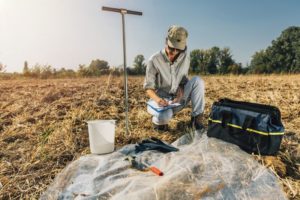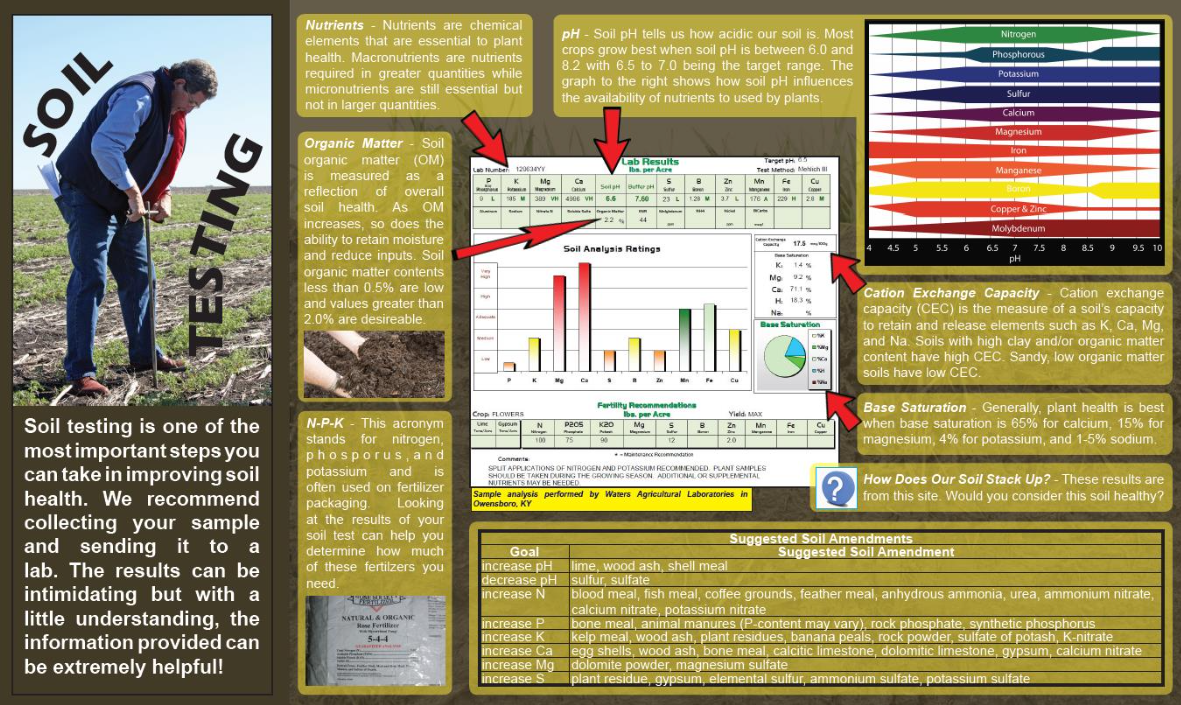Soil Testing
What is a soil test?
A soil test is a process by which elements (phosphorus, potassium, calcium, magnesium, boron, sulfur, manganese, copper, iron and zinc) are chemically removed from the soil and measured for their “plant available” content within the sample. The quantity of available nutrients in the sample determines the amount of fertilizer or other soil amendment that is recommended. A soil test also measures soil pH, organic matter and cation exchange capacity (CEC). These analyses indicate whether lime is needed and, if so, how much to apply.
Why Have Your Soil Tested?
- Encourages plant growth by providing the best lime, fertilizer or other soil amendment recommendations. When growers guess about the need for lime or fertilizers, too little or too much is likely to be applied. By using a soil test report, the grower does not need to guess.
- Diagnoses whether there is too little or too much of a nutrient.
- Promotes environmental quality.
- When gardeners apply only as much fertilizer as is necessary, nutrient runoff into surface or ground water is minimized and natural resources are protected.
- Saves money that might otherwise be spent on unneeded lime and fertilizer.
- Some home owners routinely apply phosphorus to their lawns. In areas where soil levels are high in phosphorus, a soil test could save these home owners money.
For example: When applying too much lime, soil pH may rise above the needed level, which causes nutrients such as iron, manganese, boron, copper and zinc to become less available to plants. It is also common to see homeowners purchase one bag of lime when they purchase one bag of fertilizer. Based on a lawn size of 5000 square feet, one bag of fertilizer may be enough. Applying one bag of lime over 5000 square feet, however, will have little effect on soil pH.
How To Collect A Soil Sample
Since only a small portion of the soil is used for testing, it is very important that the sample be representative of an area. For a standard soil test, take several samples from each area of your yard (front yard, shrub bed, garden, etc.). For large areas, 5-8 cores are needed, but for narrow shrub or flower borders, 2-4 cores will do the job. Mix all of the samples together in a clean pail or bucket to get your representative sample or “average” soil for your yard.
If you are targeting a problem area, you can restrict your sampling to the problem area only.
- Remove surface debris, such as plant residues, mulch or turf thatch, from the soil before inserting the soil probe, spade, or trowel.
- Sample gardens and shrub and flower beds to a depth of 6-8 inches.
- Sample turf areas to a 3-inch depth.
- Sample tree root zones to 8-12 inches or deeper.
- Sample row crops (in gardens) between the rows to avoid fertilizer bands.
- Sample front and back yard separately if they have been managed differently or contain different types of fill soil.
- Dry samples at room temperature. (Do not use artificial heat.)
- Break up any lumps and remove all stones, debris, grass, etc. When dry, mix well and eliminate clumps.
♦ These are general soil collecting recommendations. Always check with each lab about their preferred method of soil sampling.
Soil Testing Labs
A&L Great Lakes Laboratories, Inc.
3505 Conestoga Drive
Fort Wayne, IN 46808-4413
Phone: (260) 483-4759
Fax: (260) 483-5274
E-mail: lab@algreatlakes.com
Website:http://www.algreatlakes.com/
Lawn & Garden Soil Analysis, $20.00. Includes Soil pH, Buffer pH, Available Phosphorus, Exchangeable Potassium, Organic Matter, Magnesium, Calcium, Cation Exchange Capacity, and Percent Base Saturation of Cation Elements. Provides graphic display of results and suggested fertilizer materials for lawn, garden and landscape. Once received, the turnaround time for processing samples is 3 working days.
Here are more links from A&L Great Lakes Laboratory:
- Explanation Of A Soil Analysis Report
- Interpretive Guide For Soil Test Reports
- Lawns Landscapes and Gardens – Adjusting Fertilizer Product Recommendations
Below is an easy to read graphic depicting how to understand soil testing lab results

Below are other great links for Owen County residents:
List of Soil Testing Labs in Indiana
Septic System Resources for Owen County
NRCS Small Farms Soil Sampling
List of Owen County Soil Consultants
Midwestern States Environmental Consultants Association Members
 Owen County Soil & Water Conservation District
Owen County Soil & Water Conservation District